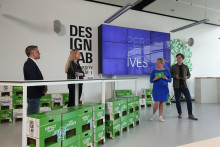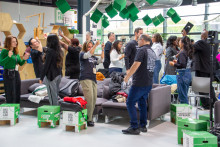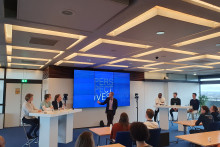About 40 people had gathered in the DesignLab for the first episode of Perspectives, which could also be followed online. Hosts Miriam Iliohan and Rick Akkerman led the discussion and presented the two main guests and the audience with several statements. Starting with the question whether media appearances add anything to the work of a scientist. A large majority of the audience, who could vote offline or online, responded positively to the statement.
The two main guests also left no room for doubt. ‘For me personally, the performances certainly add something,' said Nijboer, assistant professor of Biomedical Signals and Systems. ‘It works well to test your ideas and it provides visibility. But it has to fit your personality, though.' Fernandez Rivas, adjunct professor at the Mesoscale Chemical Systems group, agreed. As an example, he mentioned his (various) media appearances about needleless injections. ‘In the comment section of a YouTube video about my work, someone said that he was more afraid of lasers - my alternative to injections - than of a jab. That really got me thinking.’
But is there enough time to participate in the public debate, for example via social media, next to scientific work? ‘Unfortunately not,' responded Nijboer. ‘And you don't get any hours for it. It would help if I could spend one or two hours on it by contract.’ According to Fernandez Rivas, it also depends on someone's personal ambitions. ‘Being active on social media has to fit the scientist. There are plenty of other ways to communicate.’
Debate
The discussion quickly turned to the climate crisis, and the audience participated passionately. The scientific facts of the recent IPCC report seem incontrovertible, but how do you communicate about this to the outside world as a scientific community? Do you have to be 'pushy' or is a neutral tone more sensible? That is what the audience wanted to know from the two guests.
According to Fernandez Rivas, pushing is not the right option. ‘That doesn't help, I have noticed. I always try to make a professional contribution, without seeking polarisation.' Nijboer disagreed. 'Sometimes, as a scientist, you have to take a stance, even if it is based on your own opinion. Especially with the climate crisis, it is important to raise your voice.'
Rector Tom Veldkamp also joined the discussion. According to him, scientists should share their individual views in the public debate, and this can be fairly passionate. ‘But as a scientific community, we aim for a positive impact, and to achieve this, we first need to connect with the rest of society. As a university, we cannot separate ourselves from society.’
Given the many questions and remarks from the audience, the subject of the first edition of Perspectives proved to be well chosen. Via their mobile phones, (online) attendees could select the theme of the second meeting, which will take place in June. By a large majority, the audience chose student wellbeing.







